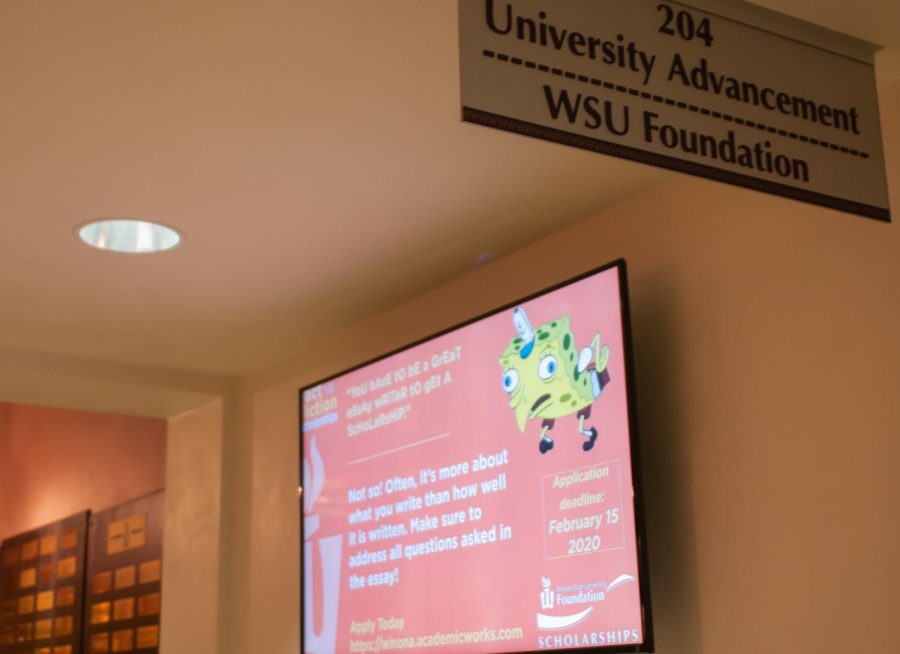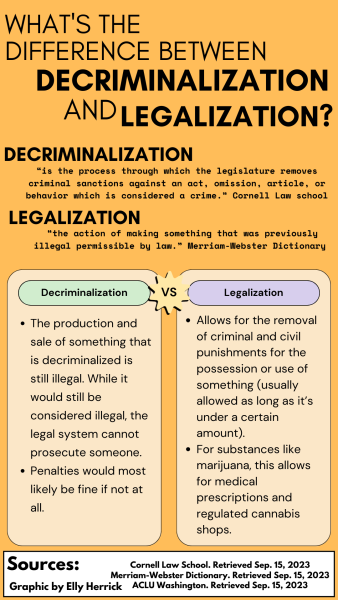Administrative fee raises questions around university foundation
The WSU Foundation is committed to funding new initiatives that meet the needs of students to improve their learning and experience, preparing them for an ever-changing world.
February 19, 2020
During the 2017 fiscal year, the Winona State University Foundation announced a 1% administrative fee to donors through an annual letter. However, some donors have alleged that the foundation gave them no notice of the fee, instead electing to hide the money withdrawal from donors.
Andrea Northam, interim vice president of advancement, said the administrative fee was not a result of the budget deficit. The administration fee predates the budget deficit.
The administrative fee was originally discussed and a notification allegedly was sent to donors in 2017. The first time this fee was taken out from donations was between July 2018 and June 2019.
The 1% administrative fee was taken from the total endowment and not each individual scholarship fund. However, each fund contributed an amount to the administrative fee that was equal to the percentage it added to the endowment, meaning the bigger donations had a larger fee than the smaller ones.
The administrative fee also has its own written policy which was put into effect in Oct. 2019. This document is not public.
As of now, the money from the administrative fee has not been allocated to anything specific. The policy behind the administrative fee states that the fee will be held in its own account and allocated by individual requests.
These requests are then processed through the Finance Committee Review Process.
Northam was unable to explain the rationale of her predecessor for choosing to start the administrative fee before having all of it allocated.
There are ideas floating around about what it could be used for, such as paying for the software needed to run the foundation.
Northam said there are two types of software used. One is to track donor information and call reports. The other is used for the scholarship side of the operations.
Northam said because the university and the foundation are different entities, having the software paid for by the foundation would provide data privacy for donors.
“That’s actually one of the things that I proposed for a use of the 1% in administration fee is to take on that software budget for us,” Northam said.
Northam said another reason for the administration fee is to bring the WSU Foundation closer to what other foundations are doing.
Most colleges, both in the MinnState system and nationally, have some kind of administrative fee, Northam said.

According to Andrea Northam most colleges in the MinnState system and nationally have some kind of administrative fee. “I’ve seen fees as high as 5% and 8%…”Northem said.
“I’ve seen fees as high as 5% and 8%. There’s lots of different ways across the board that the administrative fees apply,” Northam said.
Phil Sonnenberg, director of university advancement finance, said there is no way the WSU Foundation administrative fee could be raised.
He said that it is in the policy written about the administration fee.
One other thing the administrative fee could be used for is a capital campaign, which is when a nonprofit organization selects a short period of time to focus on getting as many donations for as much money as possible.
The university has not been able to do one since 2010. This fee could give the university the chance to do one again.
Multiple donors, including the Madland family who donated two scholarships, have said they were never notified of these fees.
“Five individuals that are all in charge of five different scholarships met with the president and Andrea Northam. And I asked everyone in the group if they got notice and we were 0 for five,” Wally Madland said.
Wally Madland said if the foundation did send out any notification, the foundation was not effective in its attempts.
Northam said the letter that originally notified donors was an annual letter sent every year, meaning some people could have ignored it.
“Again, the communication of it is somewhat buried in a narrative letter. It’s not called out necessarily which might be an issue of contention,” Northam said. “Perhaps it was just something that didn’t stand out and they looked at their financial statements and then moved on with their life.”
In an email, President Olson stated that donors were notified two to three times each.
Wally Madland said there was a meeting between himself, five other donors, President Olson and Northam in December about this issue.
In that meeting, President Olson stated that he could not do anything about the administrative fee because the WSU Foundation is a separate entity from Winona State University.
Northam said as a result of that meeting in December, the foundation has learned a lot and will learn from their mistakes.
“At this point it’s about ensuring the foundation will continue to be able to operate moving forward and presenting some of the rationale that we have assembled about the software costs and how this administrative fee is reasonable,” Northam said.
There was also a conversation at a Foundation Finance Committee meeting about the fee becoming a concern with donors. The committee discussed these concerns, usage of the fee and feedback.
Besides the meeting with the president, there have not been any meetings with donors. However, there have been some one-on-one phone calls with them.
The tension between the foundation, donors, students and others started in December when the first statement with the fee came out. This tension was escalated after Mitch Madland posted in a Facebook group called “Wazoo’s List” on Jan. 27.
“Students and Alumni, did you know that the WSU Foundation took over $400,000 from you that was designated to scholarships? All without permission and transparency,” Mitch Madland wrote in the Facebook post.
The reason Mitch Madland said the fee was taken from students is because it was taken from the principle of each scholarship.
However, a FAQ response from the university claims that scholarship amounts were not touched.
“The fee has in no way reduced the amount or number of scholarships awarded. (Yay!),” the FAQ stated.
According to Mitch Madland, a part of the Madland family who are donors to the university, this is not the case.
The Joan Kangel Madland Memorial Scholarship went from a $2,186.03 scholarship to -$232.80.
Sonnenberg said he is not sure how the Madlands would have gotten to this number. Sonnenberg tried the equation Mitch Madland said they used and got a different number.
Sonnenberg explained that the way the administrative fee was applied is possibly where the equation went wrong.
“Most donors are thinking that the 1% fee is applied to their individual principles,” Sonnenberg said, “when the fee is being applied to the total foundation endowment.”
For example, the Madlands have less than 1% of the total endowment, which results in $418.83 that they pay for the administrative fee.
Sonnenberg said the scholarship itself was not touched, just the money the Madlands’ originally donated.
Wally Madland said he would have wanted the foundation to have fundraised for the administrative fee instead of taking the money he fundraised for.
“[What] bothers me the most is that these people donated to either scholarship with the intention it would go there and the board can vote it away,” Wally Madland said.
Another place of contention is stemming from the fact that the WSU Foundation makes money from leasing East Lake Apartments.
Sonnenberg said the money received from that lease goes back to the university. It has its only set of policies stating that it cannot be touched for anything else, which is why it was not used instead of the administrative fee.
The opinions expressed in this paper are not necessarily those of Winona State University, the Minnesota State Colleges and University system, or the Winona State University student body.









































































![“[Dr. Berg] you have done an amazing job of building this program and I have always been in awe at your ability to find resources in all sorts of nooks and crannies including your own pocket to bring to campus an amazing women’s history month program,” Dr. Hyamn said.](https://winonan.org/wp-content/uploads/2023/04/52844059083_5f6fb6176d_o-475x344.jpg)
